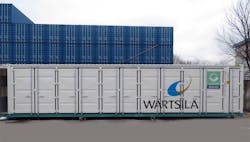Wärtsilä supplying 25-MW/48-MWh Battery Storage system for Dutch grid stabilization
Finnish on-site power equipment firm Wärtsilä took another upward step into energy storage by gaining a contract to supply a utility-scale battery system in the Netherlands.
Wärtsilä will deliver the 25-MW, 48-MWh energy storage package to GIGA Storage BV to help stabilize the Dutch grid. This is the company’s first large-scale battery project in the Netherlands and biggest energy storage system to date.
Wärtsilä plans to install the GIGA Buffalo battery system and make it operational by October 2022. GIGA Buffalo will be co-located with wind and solar assets at the Widnet smart grid, located at the Wageningen University & Research test center in Lelystad.
“The Buffalo battery will help stabilize the Netherlands’ electricity grid and save a maximum of 23,000 tons of carbon dioxide emissions per year,” said Maarten Quist, COO, GIGA Storage. “We’re pleased to work with Wärtsilä to implement this landmark project, which will help us reach our goal of deploying 1.5 GW of energy storage in Europe by 2025.” The Dutch government has set a goal to reduce greenhouse gas emissions by 49% by 2030 and a 95% reduction by 2050. To achieve these goals and provide grid resiliency with growing and intermittent renewable energy resources, it is estimated the Netherlands will need between 29 and 54-GW of energy storage capacity by 2050.
See EnergyTech's full coverage of Utility-scale and C&I Battery Storage Projects
Subscribe to our free, tri-weekly Electronic Newsletter for more stories like this
The Buffalo battery system is based on lithium iron phosphate chemistry. Wärtsilä’s deployment will also include its GridSolv Quantum modular system, as well as the GEMS Digital Energy Platform.
The company is also retained for a long-term service agreement for the GIGA Buffalo energy storage project.
Wärtsilä previously announced plans to supply the GridSolv Quantum package to AEP Onsite Partners to serve the city of Martinsville, Virginia, in the U.S. The company acquired GridSolv technology when it took control of GreenSmith Energy in 2017.
